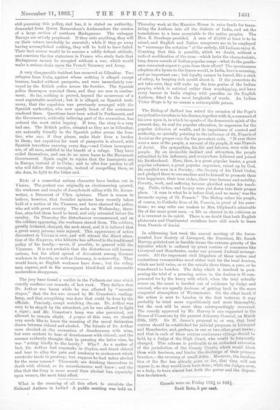In addressing last week the annual meeting of the Incor-
porated Law Society of Liverpool, the President, Mr. Enoch Harvey, pointed out in forcible terms the extreme gravity of the injustice which is suffered by great centres of commerce like Liverpool and Manchester, under our present Judicial arrange- ments. All the important civil litigation of these active and contentious communities must either wait for the local Assizes, which are held twice, or at the outside three times, a year, or be transferred to London. The delay which is involved in post- poning the trial of a pressing action to the Assizes is ill com- pensated for by the hurry with which, when- the trial actually comes on, the cause is bustled out of existence by Judge and counsel, who are equally desirous of getting back to the more congenial atmosphere of Westminster. On the other hand, if the action is sent to London in the first instance, it may probably be tried more expeditiously and more thoroughly, but the cost will be more than correspondingly increased. The remedy approved by Mr. Harvey is one suggested in the House of Commons by the present Attorney-General, on March 29th, 1879. Sir H. James's proposal is, or was, that local centres should be established for judicial purposes in Liverpool and Manchester, and, perhaps, in one or two other great towns ; and that in each of these centres continuous sittings should be held, by a Judge of the High Court, who would he frequently changed. This scheme is preferable to an unlimited extension of the jurisdiction of the County Courts, which would block them with business, and hinder tho discharge of their primary function,--the recovery of small debts. Moreover, the localisit., tion of the Bar has already gone so far, that they will not oppose it, as they would once have done ; while the Judges seem, as a *body, to have almost lost both the power and the disposi.. tion toobstruet,






































 Previous page
Previous page